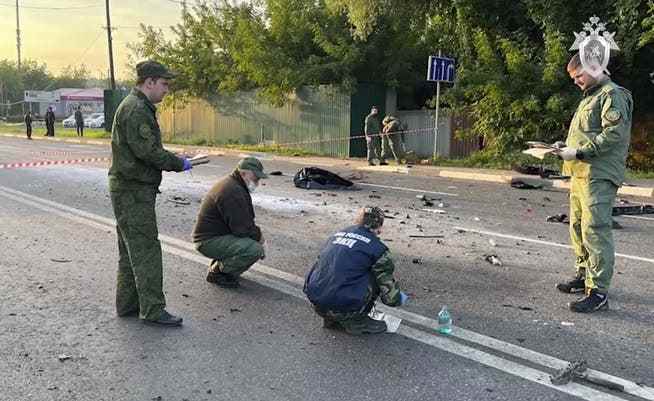The daughter of an imperialist ideologue, herself a supporter of the Ukraine war, has been assassinated in Moscow. what is known so far.
Investigators examine the car parts that are scattered after the assassination.
What happened?
Daria Dugina, 30, was driving back into the city on one of Moscow’s western arterial roads late Saturday evening when her car exploded and burned out. Rescuers found the woman’s charred body inside. According to initial investigation results, an explosive device attached to the driver’s side of the SUV detonated.
Who is Daria Dugina?
Dugina is no unknown victim. The philosopher and publicist was the daughter of the national-patriotic, ultra-conservative ideological figurehead Alexander Dugin, his right hand and like-minded people. Under the name of Platonova, she herself was an active commentator on Telegram and in propagandistic, right-wing national media and had questioned Ukraine’s right to exist in the past few months with sometimes monstrous statements.
Alexander Dugin’s daughter, Darya was killed in a car bombing in Moscow tonight.
Dugin is probably the most famous currently living proponent of the imperialist “Russkiy Mir” ideology apart from Putin himself.
Darya recently traveled to Azovstal to take celebratory selfies. pic.twitter.com/GJsJrtpTFg
— Visegrad 24 (@visegrad24) August 20, 2022
What is known so far?
The highest investigative authority in Russia has taken over the investigation and speaks of indications of a contract killing. It can be assumed that the assassination attempt was actually aimed at Dugin. The car that the young woman was driving belonged to her father. Apparently he wanted to drive back from the “Tradizia” festival outside of Moscow, which he had attended together, but then changed his mind at short notice.
Dugin is eulogized in the West as “Putin’s whisperer,” but is undoubtedly a particularly visible ideologue of Eurasian imperialism, the Kremlin’s championed notion of Russia as the center of a uniquely Eurasian civilization.
Who could the culprits be?
The Russian grouping National Republican Army is said to have claimed responsibility for the attack. The Russian politician in exile Ilya Ponomarev has this on his Youtube channel distributed and a letter of confession read out. In it, the group describes Putin as a war criminal and states that “disenfranchised people have the right to rebel against tyrants.”
For some time now, saboteurs have been disrupting Russia’s military logistics with attacks on bridges and railway lines. It is doubtful whether these groups actually carry out attacks on people. The National Republican Army’s commitment to the attack on Dugin cannot be independently confirmed.
In 2014, Ilya Ponomaryev was the only member of the Russian parliament who voted against the annexation of Crimea. He has been living in Ukraine since 2016 and publishes from Kyiv on his YouTube channel about the war in Russia.
What role does Ukraine play?
The government in Kyiv has denied any involvement in the attack. Ukrainian Presidential Advisor Mikhailo Podoliak said on television: “Of course, Ukraine has nothing to do with yesterday’s explosion because we are not a criminal state and certainly not a terrorist state.” Podoljak spoke of power struggles between different political factions in Russia.
What are the reactions?
was big in the Telegram channels media loyal to the state, propagandists and right-wing nationalist politicians expressed their horror at the crime. Even more level-headed voices among them immediately pointed the finger at the Ukrainian secret service as the perpetrator of the attack. For them, this is proof of the danger emanating from Ukraine.
The editor-in-chief of the international broadcaster RT, Margarita Simonian, like others, called for retaliatory measures against the “decision-making centers” in Kyiv. Her reaction to malicious voices from circles of the Russian regime’s opponents expresses the fear that the event could be used as a pretext for intensifying the hunt for those who think differently. Simonyan wroteit was time to “dispose of the waste” and called for the arrest of opposition figures.
What are the consequences of the assassination?
Whoever is behind the attack: This points to sore spots. If the Ukrainian side actually had anything to do with it, it put the Russian security authorities in a very bad light. Settlements within the elite or between groups who disagree about the Kremlin’s course towards Ukraine and urge it to adopt tougher policies have exposed the tensions that also exist among supporters of Russia’s aggression towards the neighboring country. The political scientist Tatyana Stanovaja measures therefore attaches some importance to the event.
Attacks of this kind act like a boomerang of devastation that Russia is bringing to Ukraine. They bring back memories of the criminal disputes of the 1990s, of explosions surrounding the war in Chechnya, and thus of a time that President Putin and his supporters still use today as a counterpoint to the “stability” achieved thanks to him. They sow further uncertainty, also among the elites, and could contribute to radicalization.
